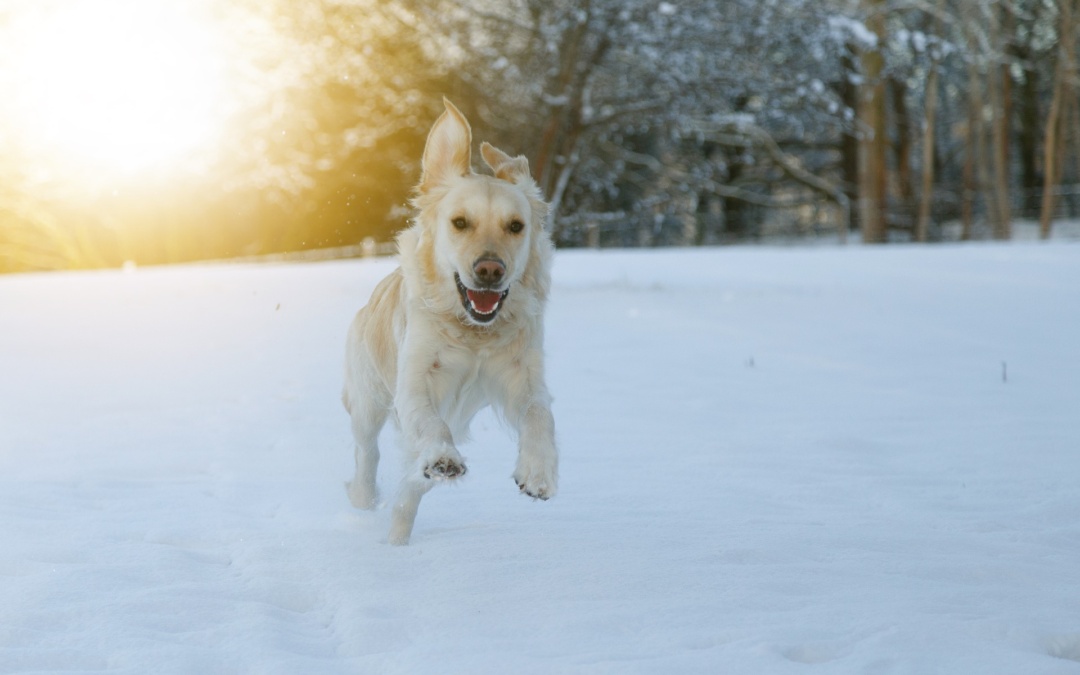Here in Vermont, we are no strangers to winter weather. And although a pet’s tolerance for cold and snowy weather can vary by breed, age, and general overall health, any pet can suffer from hypothermia, frostbite, or other cold-weather injuries. Whether your pet loves the cold and snow or prefers to snuggle up by the fire, cold weather safety is crucial to the comfort and health of your pet and to avoid a trip to our emergency room.
Winter Pet Care 101
Low temperatures are probably the most common concern for pet owners. A good rule of thumb is this: if it’s too cold outside for you, it’s too cold out for your pet. Some pets will beg to go outside, and if this is the case, ensure your pet has access to unfrozen drinking water and insulated shelter from wind and cold. When the temperature dips near freezing, the safest place for any pet is inside since even the thickest fur coat isn’t sufficient to protect them from the elements. Cold temperatures and wet, gusty wind should prompt a pet’s quick entry to a warm house. Be sure to thoroughly dry their coat and paws, and ensure they have a warm, draft-free place to snuggle up for the night.
Cold Weather Coat and Paw Care
We all may feel like bouncing off the walls when cold, ice, and snow set in. It’s important to keep up your pet’s exercise routine, but winter walks can become downright dangerous unless a few precautions are taken:
- Protect the paws: Snow, ice, and salt can irritate or damage your pet’s sensitive paw pads. Use booties to protect your pet’s pads when they are out walking or running in the snow. A protective paw balm is also a great idea to prevent paws from becoming dry and cracking.
- Avoid pet poisoning: Ice melting chemicals and salt are toxic to pets if ingested, and pet poisoning is a problem we see in our emergency hospital more often than you might expect. To prevent your dog from licking salt, antifreeze, or chemicals off their paws or body, rinse your pet’s paws in lukewarm water immediately after being outside, and wipe their belly and other exposed body areas with a dry towel. Clean up any antifreeze spills immediately, since the sweet smell and taste can prove irresistible (but deadly) to pets. Store all chemicals out of pets’ reach, and prevent your pet from licking any puddles or the ground while out and about.
- The right clothing: Never shave your dog down to the skin in winter, as a longer coat will provide more warmth. If you have a longhaired dog, simply trim the longer hairs to minimize clinging ice balls, salt crystals, and de-icing chemicals that can dry your pet’s skin. If your pet has a shorter coat, consider purchasing a sweater or dog coat with coverage from the base of the tail to the neck with coverage around the belly as well. For many dogs, this is standard winter wear.
Cars and Cold
When it’s cold out, stray, outdoor, or wild animals are going to seek out warmth wherever they can find it, and it is common for cats to curl up under the hood of a car to keep warm. The engine block provides warmth and keeps them completely protected from the weather and other cats/predators. To prevent serious injury to hiding cats, be sure to rap loudly on the hood of your car before starting the engine.
Hitting the Slopes With Your Pet
Many of us are avid skiers or snowboarders, and there is nothing we would love more than to share our beloved hobby with our dogs. The idea of our dogs running next to us as we cruise down the slopes in the backcountry is an attractive one, but the sharp edges on skis and snowboards that let us carve through icy slopes and fluffy powder also make it potentially dangerous for our four-legged companions. Accidents can happen in a split second, even if you’re careful and paying attention. Your dog can dart in front of a skier or snowboarder just starting their descent and suffer from deep cuts, cruciate tears, or other injuries that would require immediate first aid and likely emergency veterinary care in our hospital.
If you do choose to take your dog on downhill trips, be aware that it’s a big responsibility. You may opt to include them on tamer cross-country skiing excursions, but either way, make sure to bring along a complete first aid kit and have a plan to carry your dog to safety.
BEVS Is Here 24/7
These few safety tips can mean the difference between a cozy winter season and a winter pet emergency. BEVS is the only 24/7 veterinary emergency and specialty hospital in the state, and our veterinarians are experienced and trained in treating winter pet injuries. If you think your pet may need emergency care, please call us. And if you have any questions about pet winter safety, let us know.

